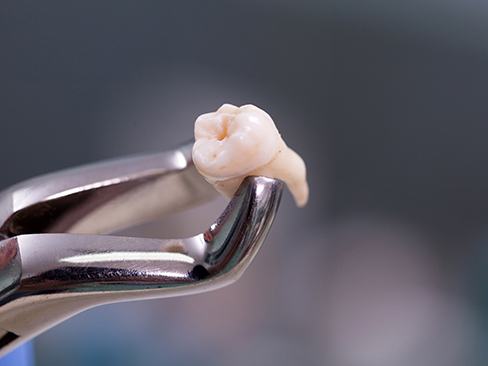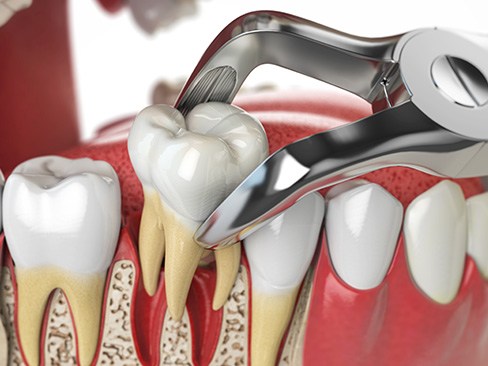
Tooth Extractions - Dallas, TX
Extractions Made Safe & Simple
At Midtown Family Dentistry of Dallas, we make every effort to help patients maintain their natural smile whenever possible. However, certain circumstances can make tooth extraction necessary. Patients having teeth removed can trust our team to handle the tooth removal process safely while preserving their comfort. If you have a tooth that’s causing serious problems, don’t hesitate to contact us for assistance and to learn more about tooth extractions at our office in Dallas, TX.

Why Choose La Prada Family Dentistry for Tooth Extractions?
- Same-Day Treatment Available
- Quick, No-Stress Wait Times
- Nitrous Oxide Available for Anxious Patients
Reasons Why Tooth Extractions Are Necessary

If a natural tooth requires extraction, the most likely reason is that it’s become so damaged or decayed that it can’t be properly restored with a filling, a dental crown, or root canal therapy. If a tooth fails to emerge from the gum tissue properly, it becomes impacted and is likely to become infected, meaning that extraction is probably the best option. In other cases, we may need to remove teeth to make room for orthodontic appliances or the placement of a custom denture. Some children may need stubborn baby teeth removed to make room for their adult set. Removing infected teeth can also prevent the germs from spreading to the rest of the smile or possibly causing dangerous secondary infections like sepsis in the rest of the body.
The Process of Removing a Tooth

The process of removing a problematic tooth begins with one of our dentists administering an appropriate anesthetic treatment to ensure that the procedure is completely painless, and you may also receive dental sedation if you need some extra help sitting comfortably. Our dentist will then use a tool called an elevator to lift the tooth from its socket before grasping it with forceps and gently rocking it back and forth to free it from its connective tissue. We recommend replacing lost teeth as soon as possible to prevent a variety of oral health problems such as gum injuries and dental misalignments, so we’ll discuss your options for restoring your tooth during your consultation.
Tooth Extraction Aftercare

Strictly following your postoperative instructions can help keep your recovery brief and complication-free. You can expect our dentists to recommend:
- Taking medications as prescribed
- Rinsing the mouth with a saltwater solution (8oz warm water mixed with half a teaspoon of salt) twenty-four hours after the procedure.
- Abstaining from smoking
- Refraining from drinking through a straw
- Avoiding strenuous exercise
- Propping up your head with pillows or cushions when lying down to reduce the blood pressure in your healing tissues
- Getting plenty of rest
Replacing lost teeth with a restorative appliance such as a denture can help prevent the rest of the smile from drifting out of alignment as well as injuries to unprotected gum tissue.
Understanding the Cost of Tooth Extractions

The cost of tooth extractions can vary somewhat depending on a few factors. When you visit us for your restorative or emergency consultation, we can assess the details of your situation and provide a cost estimate. In most cases, tooth extractions are affordable for our patients. We even have flexible payment options to make the monetary aspect of your care as low-stress as possible. For example, we welcome dental insurance and have special pricing for emergency exams.
Factors That Can Affect Tooth Extraction Cost

Some factors that may affect the cost of your tooth extraction procedure include:
- The specific tooth that needs to be removed. Some teeth are more challenging to access and extract than others, which can lead to a difference in fees.
- The number of teeth that we are removing. Logically, you can expect to pay more for the removal of several teeth than the removal of just one or two.
- The complexity of your case. We can perform most tooth extractions right here in our office. If we need to refer you to an outside specialist, they may have a pricing structure that is different from our own.
- Whether the tooth is impacted. Impacted teeth often require surgical removal, which can have greater costs than simple tooth extractions.
- Additional care. Sedation during your procedure, as well as tooth replacement afterward, can significantly add to the total cost of your care.
Does Dental Insurance Cover Tooth Extractions?

In most cases, yes, dental insurance does cover tooth extractions. Simple extractions are usually classified as a basic service, so up to 80% of their cost might be covered. Surgical extractions are often up to 50% covered. Our team welcomes insurance, and we are in-network with several major plans. We will be happy to help you understand how your benefits apply and how you can take full advantage of them.
Other Options for Making Tooth Extractions Affordable

Outside of insurance, other provisions that you may choose to take advantage of include:
- We work with CareCredit and Sunbit to provide low-interest payment plans for our services. The application process is fast and easy.
- Emergency exam special. We charge just $50 for an emergency exam and any necessary X-rays.
- In-house savings plan. Our in-house membership plan covers all preventive care and provides 20% off additional services, including tooth extractions. Signing up is easy, and you can use your benefits right away.
Would you like to learn more about tooth extractions and their cost? Get in touch with our Dallas team to ask questions or request a consultation.
Tooth Extractions FAQs
Does Getting a Tooth Extracted Hurt?
It’s natural to feel nervous about an upcoming tooth extraction if you’re not sure what to expect and are scared it might hurt. Fortunately, our team at Midtown Family Dentistry of Dallas is here to set your mind at ease. We know that many people are anxious about major procedures, but we will do everything we can to help you feel calm and relaxed the entire time.
First, we’ll apply a local anesthetic to your troublesome tooth so that you don’t feel any discomfort during your appointment, and can also offer nitrous oxide (laughing gas) as a sedative. Then, it’s normal to feel some mild to moderate tenderness and inflammation after the medications wear off. Following our post-op instructions in detail is key to preventing a painful complication known as dry socket.
Is There an Alternative to a Tooth Extraction?
No one wants to undergo an invasive procedure if there are other options, like a root canal, that might restore your tooth’s functionality. Whether or not other methods can be used depends entirely on your unique situation and the underlying issue. This surgery is often only recommended as a last resort if your tooth is too damaged or decayed to be repaired with other treatments like a filling or a dental crown.
If you’re unsure whether an extraction is truly necessary, feel free to ask! Our team is happy to discuss the possibilities so you can feel confident moving forward.
What is Recovery Like for Tooth Extractions?
Once your tooth has been successfully removed, you must follow the list of provided directions so that you can heal as quickly as possible. Forming a blood clot over the wound is essential for its recovery, and many of the instructions revolve around keeping it intact. Some common post-op orders include:
- Drink plenty of water directly from the glass. The force of suction from drinking through a straw can dislodge your blood clot.
- Keep your mouth clean to avoid infection. To disinfect your mouth, start with warm salt water rinses, then resume brushing and flossing after about three days.
- Slow the flow of any bleeding. After your extraction, we’ll press clean gauze against the wound, but you may need to change it out until the oozing stops.
- Don’t smoke. Not only can nicotine in tobacco products slow your healing, but they suppress your immune system so you can’t fight off infection.
- Manage discomfort. If we don’t prescribe pain medications, it’s usually safe to take over-the-counter options like Tylenol or ibuprofen to reduce aches and swelling.
Can I Leave the Space Empty After a Tooth Extraction?
How you replace your missing tooth is largely up to you. If you’ve had a molar removed that no one can see, you might feel tempted to leave the gap where it is. However, many patients don’t realize that their jawbone begins to thin without a root in place to stimulate new bone growth in that area. In time, it can deteriorate enough that it can no longer serve as a firm foundation, resulting in tooth loss. The sooner your replace your extracted tooth, the better you can preserve your dental health.
Dental implants are embedded directly into your jaw and can prevent this process of degeneration. You might also opt for a less invasive replacement like dentures or a dental bridge.
I Need a Checkup & Cleaning I am Looking for a Dentist for My Child I am Concerned About Bleeding Gums I Have a Cavity or Broken Tooth I am Missing One or More Teeth I am Unhappy with My Smile I Want a Straighter Smile I am Afraid/Nervous of the Dentist I am in Pain & Need Help I Need My Wisdom Teeth Removed View Our Services

